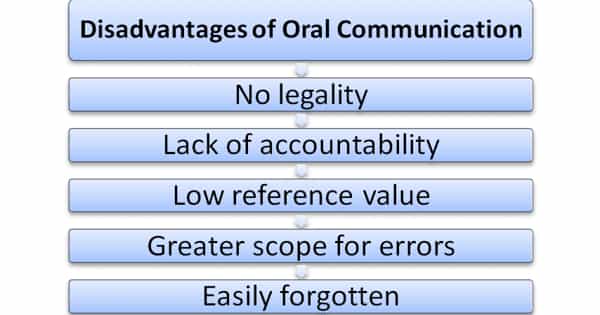Oral communication entails communication via the mouth. Individuals conversing with one another, whether in person or over the phone, are included. Oral communication includes speeches, presentations, and discussions. When the communication matter is of a temporary nature or when direct interaction is required, oral communication is generally recommended.
Oral communication suffers from various drawbacks or limitations which are listed below:
- No Record
Messages are not preserved in oral communication, so they are not found in the record book. It does not leave a record for future use. Oral messages have no legal standing in the absence of a record. These messages will not be available for retrieval in the future.
- Misunderstanding
Because of the limitations of human memory, oral messages cannot be remembered in their entirety. Communication will be hampered due to inattention in hearing oral messages. Oral messages cannot be retained in the listener’s memory for an extended period of time. The speaker may not remember what he actually said.
- Distorted meaning
Because oral messages are not recorded, their meanings can be easily distorted. Such distortion may result in a rumor that travels faster than the wind. There is a chance that an incorrect message will reach its destination. It could be due to noise or the receiver forgetting part or all of the message. Because oral messages are ineffective over long distances, messages are sent via fax, telex, or e-mail.
- Time Consuming
Oral communication may not always save time. Because there is no binding medium, such as a page or a book, this mode of communication is virtually limitless. Meetings can sometimes last for a long time without reaching a satisfactory conclusion.
- Confused Speech
If the message’s receiver has a hearing impairment, the goal of oral communication becomes more difficult to achieve. Obviously, a partial hearing will result in partial communication. As a result, all parties involved in a communication will be perplexed.
- No Legal validity
Oral messages have no legal standing. Because oral messages are not recorded, the speaker can easily deny them if the situation turns against him. Oral communications are not recorded. As a result, holding people accountable for errors, inaccuracies, or falsity in oral communication becomes difficult.
- Leakage of secret information
When a speaker speaks, he may not be careful with his words. As a result, confidential information may be disclosed. Because of the verbal nature of the exchange, there is a greater chance of misunderstanding in oral communication.
- Less effective
Oral messages typically carry less weight than written messages. When speaking, people tend to be less careful than when writing. As a result, spoken words are less precise than written words. The exact point that the speaker is attempting to make is frequently lost in a sea of words. Oral communication is less effective in certain situations, such as programs, policies, and instructions.
- Expensive
To send oral messages to a distant location, we must use the telephone, radio, television, and so on. These are high-priced mechanical devices. As a result, the receiver must spend money on such devices in order to participate in oral communication.
- Not easy to fix Responsibility
If an error occurs during oral communication, it is extremely difficult to hold someone accountable because there is no evidence for such communication. As a result, holding people accountable for errors, inaccuracies, or falsity in oral communication becomes difficult.
- Possibility of conspiracy
Because oral communication lacks evidence, there may be interested parties who take advantage of such a thing to fulfill their nefarious motive. As a result, oral communication can sometimes lead to conspiracy.
















